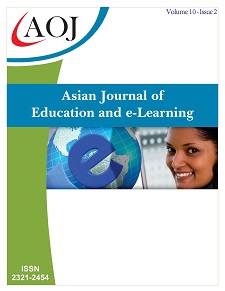The Challenges in the Post-Epidemic Era:From Education, Tourism and e-Commerce Perspectives
DOI:
https://doi.org/10.24203/ajeel.v10i2.7022Keywords:
Post-epidemic era, COVID-19, distance learning, e-commerce, artificial intelligenceAbstract
In this post-epidemic era, all aspects of life are interlinked. Everything in life is changing at a very fast pace. Human beings have to make rolling adjustments to cope with different situations to achieve a balance in the lives. For examples, in the education industry, distance learning has played the biggest role during this period, allowing students to learn without interruption. Moreover, with the growth of E-commerce, online celebrities make full use of live streaming platform to promote and introduce products to create astonishing revenues. In addition to that, tourism, which people concerned the most, has also been affected. Manufacturers have advanced deployment of emerging non-contact technologies and applications with potential market, including robots and artificial intelligence with new business opportunities after COVID-19. (蘇孟宗, 2020) During this period of the epidemic, the online ticket booking and reservation have breakthrough growth. However, the online experiences and more convenient functions will become the key elements for consumers to determine whether the platform will maintain the sustainable development.
As a result, the researcher will explore the impact and coping strategies of COVID-19, especially for Taiwan's economic restructuring, the service industry, and the education and technology industry in the post epidemic era. With an implementation of online questionnaire, the researcher has gained a better understanding of the post-epidemic era affecting tourism, education and E-commerce, and how to transition or respond in the wake of COVID-19.
References
Gimbel, E. (2019). With 5G networks, your campus meetings might become virtual. Retrieved from https://edtechmagazine.com/higher/article/2019/01/5g-networks-your-campus-meetings-might-become-virtual
Google(2021)。數位行銷基礎知識完整版。Google數位學程。
https://learndigital.withgoogle.com/digitalgarage-tw/course/digital-marketing
Wikipedia (2021) 。嚴重特殊傳染性肺炎疫情對教育的影響。
王一芝(2020年09月08日)。偽出國救航空公司?星宇張國煒:疫情下只能「不務正業」維持聲量。天下雜誌。
王芊淩(2020年7月24日)。後疫情時代的台灣!十大學者分析改變了這些事。Heho 健康。https://heho.com.tw/archives/93094
張庭瑜(2020年7月22日)。Covid-19才是真正殺手級應用!簡立峰反思:台灣防疫做太好,可能錯過轉型。商業週刊。
https://www.businessweekly.com.tw/business/blog/3003244
潘柏翰、翁世航 (2021年8月3日)。學校與教室因疫情關閉後,遠距教學不該成為「唯一」的學習途徑。The News Lens。https://www.thenewslens.com/article/154364。
蘇孟宗 (2020年11月6日)。後疫情時代展望產業新趨勢。StarUP@Taipei創業台北。
https://www.startup.taipei/index.php?action=news_detail&typeid=1&id=743
王令宜 (2020)。後疫情時代—校園防疫新生活。國家教育研究院電子報,202008 (198)。https://epaper.naer.edu.tw/edm.php?grp_no=2&edm_no=198&content_no=3496
歐陽怡 (2021)。疫情下的大學校外實習。臺灣教育評論月刊,2021,10(1),132-135。
https://mymkc.com/article/content/24507
岳炫 (2020年11月20日)。大疫情時代的旅遊業生存策略。奇寶網路。
https://www.seoseo.com.tw/article_detail_770.html
羅璿 (2021年9月15日)。6成5消費者看好餐飲業數位化衝刺!未來餐飲更貼近半零售快餐店。食事追蹤。https://www.foodnext.net/news/newstrack/paper/5234628408
周郁芬(2021年3月18日)。2021品牌經營大解密:娛樂行銷為王 蝦皮化身接觸消費者的第一哩路。數位時代Business Next。
潘韜宇(2021年6月7日)。助實體店家度難關!蝦皮推「數位轉型」優惠、蝦皮大學「成長營」速成超夯電商。立報傳媒。
Downloads
Published
Issue
Section
License
Copyright (c) 2022 Ju Chun Ou

This work is licensed under a Creative Commons Attribution-NonCommercial 4.0 International License.
- Papers must be submitted on the understanding that they have not been published elsewhere (except in the form of an abstract or as part of a published lecture, review, or thesis) and are not currently under consideration by another journal published by any other publisher.
- It is also the authors responsibility to ensure that the articles emanating from a particular source are submitted with the necessary approval.
- The authors warrant that the paper is original and that he/she is the author of the paper, except for material that is clearly identified as to its original source, with permission notices from the copyright owners where required.
- The authors ensure that all the references carefully and they are accurate in the text as well as in the list of references (and vice versa).
- Authors retain copyright and grant the journal right of first publication with the work simultaneously licensed under a Attribution-NonCommercial 4.0 International that allows others to share the work with an acknowledgement of the work's authorship and initial publication in this journal.
- Authors are able to enter into separate, additional contractual arrangements for the non-exclusive distribution of the journal's published version of the work (e.g., post it to an institutional repository or publish it in a book), with an acknowledgement of its initial publication in this journal.
- Authors are permitted and encouraged to post their work online (e.g., in institutional repositories or on their website) prior to and during the submission process, as it can lead to productive exchanges, as well as earlier and greater citation of published work (See The Effect of Open Access).
- The journal/publisher is not responsible for subsequent uses of the work. It is the author's responsibility to bring an infringement action if so desired by the author.


